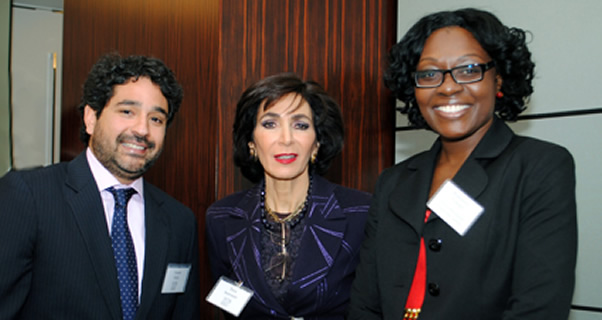Diplomatic Pouch: Investing in the New Ghana

Mawuena Trebah Appointed Acting CEO of GIPC
January 21, 2013
Mawuena Trebarh On Translating Investment Into Development
October 9, 2014
By Sarah Alaoui
Date: 1st May 2013
While Kofi Annan may be the man to call for sticky conflict issues, Mawuena Dumor Trebah is the woman to count on when considering investing in their native Ghana. Trebah, the CEO of the Ghana Investment Promotion Centre (GIPC), newly appointed by President John Dramani Mahama, covered the ins and outs of business opportunities in the country at a luncheon hosted by Patton Boggs LLP on March 26.
A forceful personality, Trebah comes from an impressive family of civic leaders—her father was a former member of Ghana’s Electoral Commission and her grandfather wrote and composed the country’s national anthem. With this legacy and more than a decade of experience working in corporate environments, it is no wonder how she ended up in her present calling. However, despite the various accolades accumulated under her belt, the words she received from one Ghanaian woman stand out as her greatest achievement.
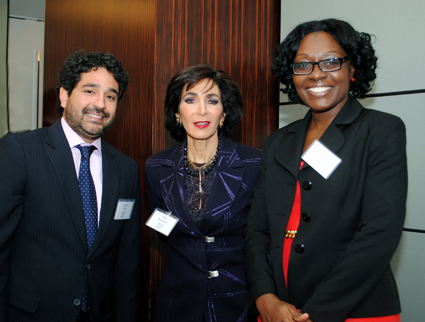
From left, Tomás Solís, an Of Counsel at Patton Boggs, Patton Boggs international energy policy advisor Tess Serranti, and Ghana Investments Promotion Council CEO Mawuena Trebarh.
Trebah was called to reckon with a group of local women who had formed a roadblock in front of a mining site, uncertain and distrustful of how the work would affect their daily lives. While explaining to the tough crowd how the worksite could be a win-win situation for them, she noticed an older woman that had stayed silent, listening quietly to Trebah speak.
“You represent the truth, not the mining company and not us,” the woman finally spoke up—a message that became the basis of Trebah’s personal drive.
Against a backdrop of mute video images showcasing the colorful culture and people of Ghana, the discussion opened with Patton Boggs’s director of strategic business initiatives and founder of the Jack Kemp Foundation, Jimmy Kemp, sharing warm anecdotes about his late father’s relationship with Africa. Quoting a speech from the senior Kemp, he prefaced Trebah’s talk with the sentiment that one need not be African to feel at home on the continent.
Highlighting the merits of “the new Ghana”—most of which are enshrined in the Ghana Investment Promotion Centre Act of 1994—Trebah broke down the nitty-gritty of conducting business in the country to a room of potential future stakeholders. A government agency that reports directly to President Mahama, the Centre has served as the information and facilitation hub for domestic and international investments—or as Trebah puts it, “a one-stop shop for all of your investment needs”—since the 1990s. It has experienced a significant shift over the years in its approach with a growing focus on strategic investments covering specific sectors such as infrastructure, energy, and agriculture.
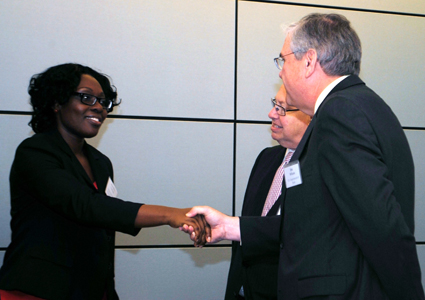
Ghana Investments Promotion Council CEO Mawuena Trebarh (left) greets Executive Vice President and Chief Operating Officer of the Council on Competitiveness, Bill Booher, and Senior Coordinator for Trade Promotion and Commercial Affairs at the State Department's Bureau of African Affairs, Jim Wilson.
Patton Boggs’s director of strategic business initiatives and founder of the Jack Kemp Foundation, Jimmy Kemp, kicks off the investment in Ghana discussion with anecdotes about his father.
“Ghana is and has been the buzzword for institutions such as the International Monetary Fund and the World Bank—the steadily growing number of investments reflects this,” Trebah said.
She took questions between bites of her sandwich, joking about the size and scope of portions in the United States. “And the gas? What’s going on with the gas?” someone piped up, asking what had been on more than a few minds. He pointed out that investment cannot be feasibly planned if the operation will take more than ten years.
Dispelling theories of varying time frames for the gas to come on-stream, Trebah hinged the process on the quality of investors involved. “All rumors should be taken with a grain of salt unless you’re speaking directly with the decision-makers themselves,” she asserted. She warned about the tendency to mesh different countries’ experiences in the region together, saying that each has a different history and varying characteristics that either facilitate or impede resource exploitation.
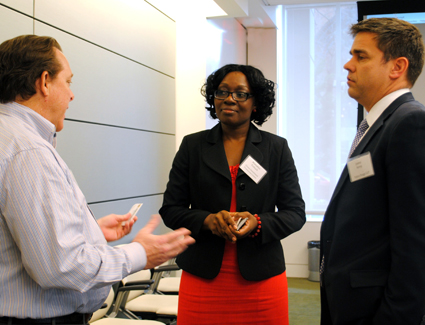
From left, Patton Boggs partner Douglas Boggs speaks with Ghana Investments Promotion Council CEO Mawuena Trebarh and Patton Boggs’s director of strategic business initiatives and founder of the Jack Kemp Foundation, Jimmy Kemp.
“The time to invest is now—now is the new Ghana, not later,” she said.
Other concerns related to business in fields such as medicine and education. Trebah mentioned the importance of collaborating with academic institutions to tackle issues such as the lack of skill sets in very specialized sectors—bioengineering is an underdeveloped study in the country’s universities, for example, while the pharmaceutical industry is rapidly growing. Agriculture is also one of Ghana’s surprisingly booming sectors.
Other concerns related to business in fields such as medicine and education. Trebah mentioned the importance of collaborating with academic institutions to tackle issues such as the lack of skill sets in very specialized sectors—bioengineering is an underdeveloped study in the country’s universities, for example, while the pharmaceutical industry is rapidly growing. Agriculture is also one of Ghana’s surprisingly booming sectors.
The country’s role as an entry point to accessing markets in neighboring Nigeria was also raised as a point of interest for investors. Trade barriers between the two nations have made business and regional integration more difficult. Trebah underlined GIPC’s focus on reassessing trade agreements and new legislation as well as leveraging Ghana’s leadership in the Economic Community Of West African States and the African Union.
Those wishing to take advantage of the opportunities Ghana has to offer—Trebah’s convincing presentation of “this last great business frontier” would persuade even the queasiest of investors—can find a guide in the GIPC to help them navigate the terrain of questions such as how to obtain easy access to land, power (Ghana has had challenges with the supply of power), and who to engage when doing business in the country.
“It depends on how you look at things—they can either be challenges or opportunities,” she said.
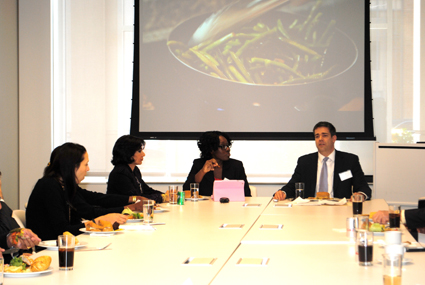
Original Source: http://washdiplomat.com/DPouch/2013/May1/story4pattonboggs.html

